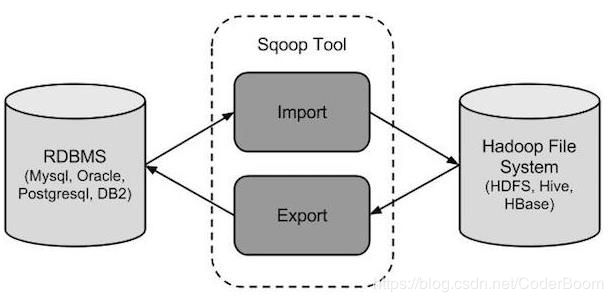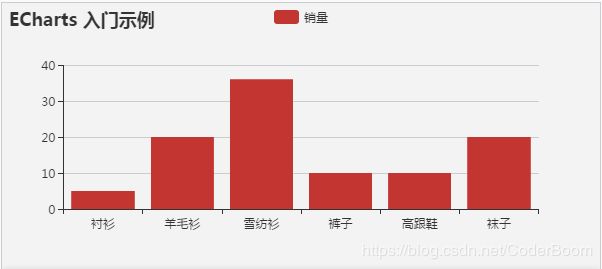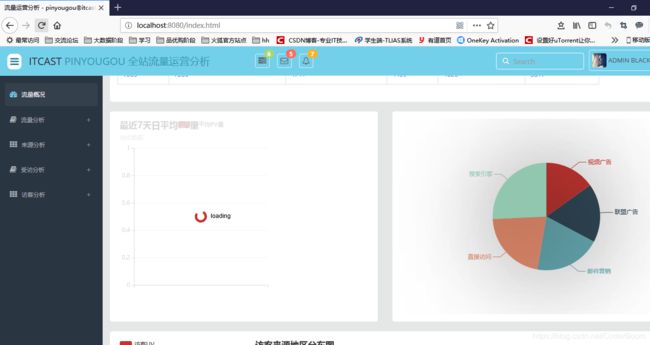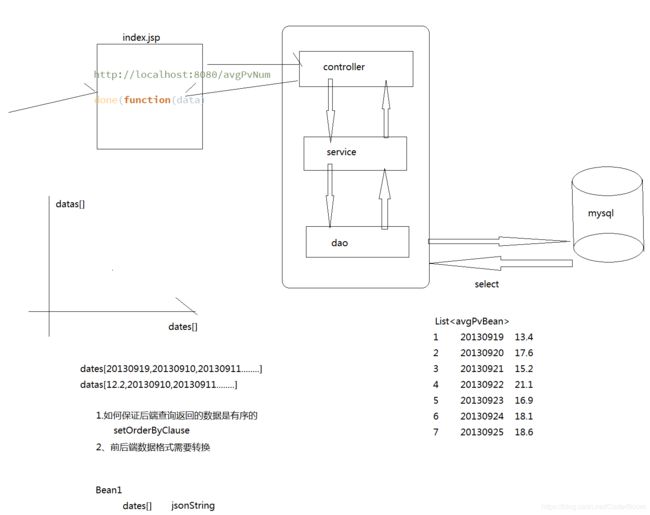网站日志流量系统----【结果输出模块】
模块开发----结果导出
1. Apache Sqoop
Sqoop 是Hadoop 和关系数据库服务器之间传送数据的一种工具 .
Sqoop:“SQL 到 Hadoop 和 Hadoop 到 SQL

导入导出是站在Apache的角度来说的
Sqoop工作机制是将导入或导出命令翻译成mapreduce程序来实现。
在翻译出的 mapreduce 中主要是对 inputformat 和 outputformat 进行定制。
sqoop 安装
安装 sqoop 的前提是已经具备java 和 hadoop 的环境
最新稳定版: 1.4.6
上传安装包到 /export/servers
解压并改名 , 删除安装包即可
配置文件修改:mv sqoop-env-template.sh sqoop-env.sh
vi sqoop-env.sh
which hadoop查询hadoop安装路径
由于我们hadoop的HADOOP_COMMON_HOME和HADOOP_MAPRED_HOME就是同一个路径 , 因此路径相同
# Licensed to the Apache Software Foundation (ASF) under one or more
# contributor license agreements. See the NOTICE file distributed with
# this work for additional information regarding copyright ownership.
# The ASF licenses this file to You under the Apache License, Version 2.0
# (the "License"); you may not use this file except in compliance with
# the License. You may obtain a copy of the License at
#
# http://www.apache.org/licenses/LICENSE-2.0
#
# Unless required by applicable law or agreed to in writing, software
# distributed under the License is distributed on an "AS IS" BASIS,
# WITHOUT WARRANTIES OR CONDITIONS OF ANY KIND, either express or implied.
# See the License for the specific language governing permissions and
# limitations under the License.
# included in all the hadoop scripts with source command
# should not be executable directly
# also should not be passed any arguments, since we need original $*
# Set Hadoop-specific environment variables here.
#Set path to where bin/hadoop is available
export HADOOP_COMMON_HOME=/export/servers/hadoop-2.7.4
#Set path to where hadoop-*-core.jar is available
export HADOOP_MAPRED_HOME=/export/servers/hadoop-2.7.4
#set the path to where bin/hbase is available
#export HBASE_HOME=
#Set the path to where bin/hive is available
export HIVE_HOME=/export/servers/hive
#Set the path for where zookeper config dir is
#export ZOOCFGDIR=
由于sqoop中没有mysql 的 jdbc 驱动包 , 加入到其中 , 导入mysql的jdbc的驱动包mysql-connector-java-5.1.28.jar到$SQOOP_HOME/lib/下
验证启动 :
bin/sqoop list-databases --connect jdbc:mysql://localhost:3306/ --username root --password 123
注 : sqoop命令要求在一行写完 , 如果一行写不完 , 在换行出添加\即可
本命令会列出所有 mysql 的数据库 , 到这里,整个 Sqoop 安装工作完成。
2. Sqoop导入
将数据导入 HDFS的语法$ sqoop import (generic-args) (import-args)
Sqoop 测试表数据
在 mysql 中创建数据库 userdb,然后执行参考资料中的 sql 脚本:创建三张表: emp emp_add emp_conn。
所有操作都是在sqoop的文件夹下
- 导入mysql表数据到HDFS
bin/sqoop import \
--connect jdbc:mysql://node-1:3306/userdb \
--username root \
--password 123 \
--target-dir /sqoopresult \
--table emp --m 1
# --m表示mapreduce的个数
查看
hdfs dfs -cat /sqoopresult/part-m-00000
tips: 导入mysql数据到hdfs,默认分隔符是
逗号
- 导入mysql表数据到hive , 需要两步:
- 复制mysql中表结构到hive中
- 复制表数据到hive表对应的hdfs路径下
导入到hive中,数据默认分隔符是'\001'
将关系型数据的表结构复制到hive中
bin/sqoop create-hive-table \
--connect jdbc:mysql://node-1:3306/userdb \
--table emp_add \
--username root \
--password 123 \
--hive-table test01.emp_add_sp
其中 --table emp_add为mysql中的数据库sqoopdb中的表
--hive-table emp_add_sp 为hive中新建的表名称
从关系数据库导入文件到hive中
bin/sqoop import \
--connect jdbc:mysql://node-1:3306/userdb \
--username root \
--password 123 \
--table emp_add \
--hive-table test01.emp_add_sp \
--hive-import \
--m 1
- 导入表数据子集
bin/sqoop import \
--connect jdbc:mysql://node-1:3306/userdb \
--username root \
--password 123 \
--where "city ='sec-bad'" \
--target-dir /wherequery \
--table emp_add --m 1
将表数据中city为'sec-bad'到hdfs下的'/wherequery' , 分隔符是逗号
bin/sqoop import \
--connect jdbc:mysql://node-1:3306/userdb \
--username root \
--password 123 \
--target-dir /wherequery12 \
--query 'select id,name,deg from emp WHERE id>1203 and $CONDITIONS' \
--split-by id \
--fields-terminated-by '\001' \
--m 1
导入到hdfs上并设置分隔符为'\001'
-
增量导入(对应的是全量) : 上次导出数据之后,本次导入数据之前中间新增的数据
sqoop中增量导入的判断是通过上次导入到某个列的某个值来标识 的,这个值由用户自己维护,一般企业中选择不重复且自增长的主键最多,自增长的时间也可以。
bin/sqoop import \
--connect jdbc:mysql://node-1:3306/sqoopdb \
--username root \
--password 123 \
--table emp --m 1 \
--incremental append \
--check-column id \
--last-value 1205
3. Sqoop 导出
将数据从 HDFS 导出到 RDBMS 数据库导出前,目标表必须存在于目标数据库中。
export 命令语法:$ sqoop export (generic-args) (export-args)
-
导出hdfs、hive数据到mysql
- 手动自己去mysql根据结构化数据类型创建相应的表
- 执行导出数据操作
-
sqoop 导出数据至mysql
/emp_data/
1201,gopal,manager,50000,TP
1202,manisha,preader,50000,TP
1203,kalil,php dev,30000,AC
1204,prasanth,php dev,30000,AC
1205,kranthi,admin,20000,TP
1206,satishp,grpdes,20000,GR
首先需要手动创建mysql中的目标表:
mysql> USE userdb;
mysql> CREATE TABLE employee (
id INT NOT NULL PRIMARY KEY,
name VARCHAR(20),
deg VARCHAR(20),
salary INT,
dept VARCHAR(10));
然后执行导出命令
bin/sqoop export \
--connect jdbc:mysql://node-1:3306/userdb \
--username root \
--password 123 \
--table employee \
--export-dir /emp_data/
1)列出mysql数据库中的所有数据库命令
bin/sqoop list-databases \
--connect jdbc:mysql://node-21:3306 \
--username root \
--password 123
2)连接mysql并列出数据库中的表命令
bin/sqoop list-tables \
--connect jdbc:mysql://node-1:3306/userdb \
--username root \
--password 123
- 项目中实际数据导出操作
--建表
create table dw_user_dstc_ip_h(
remote_addr varchar(30),
pvs bigint,
hour varchar(10)
)
bin/sqoop export \
--connect jdbc:mysql://node-1:3306/userdb \
--username root \
--password 123 \
--table dw_user_dstc_ip_h \
--export-dir /user/hive/warehouse/weblog.db/dw_user_dstc_ip_h/
报错 针对直接位于hdfs上的数据 sqoop默认分隔符是`,` 需要指定分隔符
Can't parse input data: '86.143.113.226150918 09'
正确如下:
bin/sqoop export \
--connect jdbc:mysql://node-1:3306/userdb \
--username root \
--password 123 \
--table dw_user_dstc_ip_h \
--export-dir /user/hive/warehouse/weblog.db/dw_user_dstc_ip_h/ \
--fields-terminated-by '\001'
tips : sqoop实际生产环境中 关于mysql地址 尽量不要使用;localhost 可用ip或者域名代替
模块开发----工作流调度
整个项目的数据按照处理过程,从数据采集到数据分析,再到结果数据的导出,一系列的任务可以分割成若干个 azkaban 的 job 单元,然后由工作流调度器调度执行。
调度脚本的编写难点在于 shell 脚本。但是一般都是有固定编写模式。大家可以参考资料中的脚本进行编写。大体框架如下:
#!/bin/bash#set java env#set hadoop env- #设置一些主类、目录等常量
- #获取时间信息
- #shell 主程序、结合流程控制(if…else)去分别执行 shell 命令。
- azkaban调度hive
可以采用执行sql文件脚本
bin/hive -f etl_every_hour.sql
bin/hive -e 'select....'
- 首先将编写好的mr程序依次打包
- 编写job脚本
# weblog_preprocess.job
type=command
command=/export/servers/hadoop-2.7.4/bin/hadoop jar weblog_preprocess.jar /test/input /test/output
----------------------------------
# weblog_click_pageviews.job
type=command
dependencies=weblog_preprocess
command=/export/servers/hadoop-2.7.4/bin/hadoop jar weblog_click_pageviews.jar
-----------------------------------
# weblog_click_visits.job
type=command
dependencies=weblog_click_pageviews
command=/export/servers/hadoop-2.7.4/bin/hadoop jar weblog_click_visits.jar
- 将jar包和job脚本打包成zip
上传至azkaban上即可
开启azkaban
首先进入webserver下执行bin/azkaban-web-start.sh
再进入到executor下执行bin/azkaban-executor-start.sh
- 导入数据到input下
- 执行azkaban即可
- 问题:azkaban上传大文件出错
Installation Failed. Error chunking
Caused by: java.sql.SQLException: Packet for query is too large (1625872 > 1048576). You can change this value on the server by sett
ing the max_allowed_packet' variable.
解决办法:https://blog.csdn.net/sunny05296/article/details/80446944
模块开发----数据可视化
1. Echarts 介绍
ECharts 是一款由百度前端技术部开发的,基于 Javascript 的数据可视化图表库,提供直观,生动,可交互,可个性化定制的数据可视化图表 .
2. Echarts使用
- 页面引入echarts的js库
- 创建一个dom容器(div)
- 根据容器初始化一个echarts实例
var myChart = echarts.init(document.getElementById('main'));
- 根据官网查找实例 确定自己需要图标的option选项
http://echarts.baidu.com/
- 把option设置到实例中
myChart.setOption(option);
实际使用中,最大工作量在于把数据按照前端需要的格式返回。
2.1 Echarts----简单入门
2.1.1 下载Echarts
开发环境建议下载源代码版本,包含了常见的错误提示和警告。
2.1.2 页面引入Echarts
Echarts3 只需要像普通的JavaScript库一样用script标签引入即可 .
<html>
<head>
<meta charset="utf-8">
<script src="echarts.min.js">script>
head>
html>
2.1.3 绘制一个简单的图表
在绘图前我们需要为 ECharts 准备一个具备高宽的 DOM 容器:
<body>
<div id="main" style="width: 600px;height:400px;">div>
body>
然后就可以通过 echarts.init 方法初始化一个 echarts 实例并通过 setOption 方法生成一个简单的柱状图,下面是完整代码。
<html>
<head>
<meta charset="utf-8">
<title>EChartstitle>
<script src="echarts.min.js">script>
head>
<body>
<div id="main" style="width: 600px;height:400px;">div>
<script type="text/javascript">
// 基于准备好的 dom,初始化 echarts 实例
var myChart = echarts.init(document.getElementById('main'));
// 指定图表的配置项和数据
var option = {
title: {
text: 'ECharts 入门示例'
},
tooltip: {},
legend: {
data:['销量']
},
xAxis: {
data: ["衬衫","羊毛衫","雪纺衫","裤子","高跟鞋","袜子"]
},
yAxis: {},
series: [{
name: '销量',
type: 'bar',
data: [5, 20, 36, 10, 10, 20]
}]
};
// 使用刚指定的配置项和数据显示图表。
myChart.setOption(option);
script>
body>
html>
可以看到如下图片
3. 数据可视化的展现
几个开发细节注意点:
4.1 Mybatis example 排序问题
example.setOrderByClause("dateStr ASC");
查询结果便可以根据 dataStr 字段正序排列(从小到大)
4.2 Echarts 前端数据格式问题
注意,当异步加载数据的时候,前端一般需要的是数据格式是数组。一定要对应上。在这里我们可以使用 Java Bean 封装数据,然后转换成 json 扔到前端,对应上相应的字段即可。
ObjectMapper om = new ObjectMapper();
beanJson = om.writeValueAsString(bean);
4.3 Controller 返回的 json
@RequestMapping(value="/xxxx",produces="application/json;charset=UTF-8")
@ResponseBody
数据可视化展示详细步骤
- 首先创建一个web工程用于数据可视化展示
- 导入pom文件
<dependencies>
<dependency>
<groupId>org.springframeworkgroupId>
<artifactId>spring-contextartifactId>
<version>4.2.4.RELEASEversion>
dependency>
<dependency>
<groupId>org.springframeworkgroupId>
<artifactId>spring-beansartifactId>
<version>4.2.4.RELEASEversion>
dependency>
<dependency>
<groupId>org.springframeworkgroupId>
<artifactId>spring-webmvcartifactId>
<version>4.2.4.RELEASEversion>
dependency>
<dependency>
<groupId>org.springframeworkgroupId>
<artifactId>spring-jdbcartifactId>
<version>4.2.4.RELEASEversion>
dependency>
<dependency>
<groupId>org.springframeworkgroupId>
<artifactId>spring-aspectsartifactId>
<version>4.2.4.RELEASEversion>
dependency>
<dependency>
<groupId>org.springframeworkgroupId>
<artifactId>spring-jmsartifactId>
<version>4.2.4.RELEASEversion>
dependency>
<dependency>
<groupId>org.springframeworkgroupId>
<artifactId>spring-context-supportartifactId>
<version>4.2.4.RELEASEversion>
dependency>
<dependency>
<groupId>org.mybatisgroupId>
<artifactId>mybatisartifactId>
<version>3.2.8version>
dependency>
<dependency>
<groupId>org.mybatisgroupId>
<artifactId>mybatis-springartifactId>
<version>1.2.2version>
dependency>
<dependency>
<groupId>com.github.miemiedevgroupId>
<artifactId>mybatis-paginatorartifactId>
<version>1.2.15version>
dependency>
<dependency>
<groupId>mysqlgroupId>
<artifactId>mysql-connector-javaartifactId>
<version>5.1.32version>
dependency>
<dependency>
<groupId>com.alibabagroupId>
<artifactId>druidartifactId>
<version>1.0.9version>
dependency>
<dependency>
<groupId>jstlgroupId>
<artifactId>jstlartifactId>
<version>1.2version>
dependency>
<dependency>
<groupId>javax.servletgroupId>
<artifactId>servlet-apiartifactId>
<version>2.5version>
<scope>providedscope>
dependency>
<dependency>
<groupId>javax.servletgroupId>
<artifactId>jsp-apiartifactId>
<version>2.0version>
<scope>providedscope>
dependency>
<dependency>
<groupId>junitgroupId>
<artifactId>junitartifactId>
<version>4.12version>
dependency>
<dependency>
<groupId>com.fasterxml.jackson.coregroupId>
<artifactId>jackson-databindartifactId>
<version>2.4.2version>
dependency>
dependencies>
<build>
<finalName>${project.artifactId}finalName>
<resources>
<resource>
<directory>src/main/javadirectory>
<includes>
<include>**/*.propertiesinclude>
<include>**/*.xmlinclude>
includes>
<filtering>falsefiltering>
resource>
<resource>
<directory>src/main/resourcesdirectory>
<includes>
<include>**/*.propertiesinclude>
<include>**/*.xmlinclude>
includes>
<filtering>falsefiltering>
resource>
resources>
<plugins>
<plugin>
<groupId>org.apache.maven.pluginsgroupId>
<artifactId>maven-compiler-pluginartifactId>
<version>3.2version>
<configuration>
<source>1.7source>
<target>1.7target>
<encoding>UTF-8encoding>
configuration>
plugin>
<plugin>
<groupId>org.apache.tomcat.mavengroupId>
<artifactId>tomcat7-maven-pluginartifactId>
<version>2.2version>
<configuration>
<path>/path>
<port>8080port>
configuration>
plugin>
plugins>
build>
-
spring的配置文件等
- applicationContext-dao.xml
<beans xmlns="http://www.springframework.org/schema/beans" xmlns:context="http://www.springframework.org/schema/context" xmlns:p="http://www.springframework.org/schema/p" xmlns:aop="http://www.springframework.org/schema/aop" xmlns:tx="http://www.springframework.org/schema/tx" xmlns:xsi="http://www.w3.org/2001/XMLSchema-instance" xsi:schemaLocation="http://www.springframework.org/schema/beans http://www.springframework.org/schema/beans/spring-beans-4.2.xsd http://www.springframework.org/schema/context http://www.springframework.org/schema/context/spring-context-4.2.xsd http://www.springframework.org/schema/aop http://www.springframework.org/schema/aop/spring-aop-4.2.xsd http://www.springframework.org/schema/tx http://www.springframework.org/schema/tx/spring-tx-4.2.xsd http://www.springframework.org/schema/util http://www.springframework.org/schema/util/spring-util-4.2.xsd"> <context:property-placeholder location="classpath:properties/db.properties" /> <bean id="dataSource" class="com.alibaba.druid.pool.DruidDataSource" destroy-method="close"> <property name="url" value="${jdbc.url}" /> <property name="username" value="${jdbc.username}" /> <property name="password" value="${jdbc.password}" /> <property name="driverClassName" value="${jdbc.driver}" /> <property name="maxActive" value="10" /> <property name="minIdle" value="5" /> bean> <bean id="sqlSessionFactory" class="org.mybatis.spring.SqlSessionFactoryBean"> <property name="dataSource" ref="dataSource" /> <property name="configLocation" value="classpath:mybatis/SqlMapConfig.xml" /> bean> <bean class="org.mybatis.spring.mapper.MapperScannerConfigurer"> <property name="basePackage" value="com.itck.mapper" /> bean> beans>- applicationContext-service.xml
<beans xmlns="http://www.springframework.org/schema/beans" xmlns:context="http://www.springframework.org/schema/context" xmlns:p="http://www.springframework.org/schema/p" xmlns:aop="http://www.springframework.org/schema/aop" xmlns:tx="http://www.springframework.org/schema/tx" xmlns:xsi="http://www.w3.org/2001/XMLSchema-instance" xsi:schemaLocation="http://www.springframework.org/schema/beans http://www.springframework.org/schema/beans/spring-beans-4.2.xsd http://www.springframework.org/schema/context http://www.springframework.org/schema/context/spring-context-4.2.xsd http://www.springframework.org/schema/aop http://www.springframework.org/schema/aop/spring-aop-4.2.xsd http://www.springframework.org/schema/tx http://www.springframework.org/schema/tx/spring-tx-4.2.xsd http://www.springframework.org/schema/util http://www.springframework.org/schema/util/spring-util-4.2.xsd"> <context:component-scan base-package="com.itck.service"/> beans>- applicationContext-trans.xml
<beans xmlns="http://www.springframework.org/schema/beans" xmlns:context="http://www.springframework.org/schema/context" xmlns:p="http://www.springframework.org/schema/p" xmlns:aop="http://www.springframework.org/schema/aop" xmlns:tx="http://www.springframework.org/schema/tx" xmlns:xsi="http://www.w3.org/2001/XMLSchema-instance" xsi:schemaLocation="http://www.springframework.org/schema/beans http://www.springframework.org/schema/beans/spring-beans-4.2.xsd http://www.springframework.org/schema/context http://www.springframework.org/schema/context/spring-context-4.2.xsd http://www.springframework.org/schema/aop http://www.springframework.org/schema/aop/spring-aop-4.2.xsd http://www.springframework.org/schema/tx http://www.springframework.org/schema/tx/spring-tx-4.2.xsd http://www.springframework.org/schema/util http://www.springframework.org/schema/util/spring-util-4.2.xsd"> <bean id="transactionManager" class="org.springframework.jdbc.datasource.DataSourceTransactionManager"> <property name="dataSource" ref="dataSource" /> bean> <tx:advice id="txAdvice" transaction-manager="transactionManager"> <tx:attributes> <tx:method name="save*" propagation="REQUIRED" /> <tx:method name="insert*" propagation="REQUIRED" /> <tx:method name="add*" propagation="REQUIRED" /> <tx:method name="create*" propagation="REQUIRED" /> <tx:method name="delete*" propagation="REQUIRED" /> <tx:method name="update*" propagation="REQUIRED" /> <tx:method name="find*" propagation="SUPPORTS" read-only="true" /> <tx:method name="select*" propagation="SUPPORTS" read-only="true" /> <tx:method name="get*" propagation="SUPPORTS" read-only="true" /> tx:attributes> tx:advice> <aop:config> <aop:advisor advice-ref="txAdvice" pointcut="execution(* com.itck.service..*.*(..))" /> aop:config> beans>- springmvc
<beans xmlns="http://www.springframework.org/schema/beans" xmlns:xsi="http://www.w3.org/2001/XMLSchema-instance" xmlns:p="http://www.springframework.org/schema/p" xmlns:context="http://www.springframework.org/schema/context" xmlns:mvc="http://www.springframework.org/schema/mvc" xsi:schemaLocation="http://www.springframework.org/schema/beans http://www.springframework.org/schema/beans/spring-beans-4.2.xsd http://www.springframework.org/schema/mvc http://www.springframework.org/schema/mvc/spring-mvc-4.2.xsd http://www.springframework.org/schema/context http://www.springframework.org/schema/context/spring-context-4.2.xsd"> <context:component-scan base-package="com.itck.controller" /> <mvc:annotation-driven /> <bean class="org.springframework.web.servlet.view.InternalResourceViewResolver"> <property name="prefix" value="/WEB-INF/jsp/" /> <property name="suffix" value=".jsp" /> bean> <mvc:resources location="/css/" mapping="/css/**"/> <mvc:resources location="/js/" mapping="/js/**"/> <mvc:resources location="/echarts/" mapping="/echarts/**"/> <mvc:resources location="/assets/" mapping="/assets/**"/> <mvc:resources location="/img/" mapping="/img/**"/> beans> -
导入properties文件
- db.properties
jdbc.driver=com.mysql.jdbc.Driver jdbc.url=jdbc:mysql://node-1:3306/sqoopdb?characterEncoding=utf-8 jdbc.username=root jdbc.password=123 -
mybatis配置文件
- SqlMapConfig.xml
<configuration> configuration> -
web.xml
<web-app xmlns:xsi="http://www.w3.org/2001/XMLSchema-instance"
xmlns="http://java.sun.com/xml/ns/javaee"
xsi:schemaLocation="http://java.sun.com/xml/ns/javaee http://java.sun.com/xml/ns/javaee/web-app_2_5.xsd"
version="2.5">
<display-name>report_datadisplay-name>
<welcome-file-list>
<welcome-file>index.htmlwelcome-file>
welcome-file-list>
<context-param>
<param-name>contextConfigLocationparam-name>
<param-value>classpath:spring/applicationContext-*.xmlparam-value>
context-param>
<listener>
<listener-class>org.springframework.web.context.ContextLoaderListenerlistener-class>
listener>
<filter>
<filter-name>CharacterEncodingFilterfilter-name>
<filter-class>org.springframework.web.filter.CharacterEncodingFilterfilter-class>
<init-param>
<param-name>encodingparam-name>
<param-value>utf-8param-value>
init-param>
filter>
<filter-mapping>
<filter-name>CharacterEncodingFilterfilter-name>
<url-pattern>/*url-pattern>
filter-mapping>
<servlet>
<servlet-name>data-reportservlet-name>
<servlet-class>org.springframework.web.servlet.DispatcherServletservlet-class>
<init-param>
<param-name>contextConfigLocationparam-name>
<param-value>classpath:spring/springmvc.xmlparam-value>
init-param>
<load-on-startup>1load-on-startup>
servlet>
<servlet-mapping>
<servlet-name>data-reportservlet-name>
<url-pattern>/url-pattern>
servlet-mapping>
<error-page>
<error-code>404error-code>
<location>/WEB-INF/jsp/404.jsplocation>
error-page>
web-app>
根据配置文件建立相应的包 , 然后编写Controller层 , 查看首页
- IndexController.java
@Controller
public class IndexController {
@RequestMapping("/index")
public String showIndex(){
return "index";
}
}
即可看到相应的页面 , 我们发现数据没有导入到页面
因此此时我们考虑如何将页面中需要的数据导入进来
动态加载数据思路
- 通过代码生成器生成所需要的代码导入到项目中
import java.io.File;
import java.io.IOException;
import java.util.ArrayList;
import java.util.List;
import org.mybatis.generator.api.MyBatisGenerator;
import org.mybatis.generator.config.Configuration;
import org.mybatis.generator.config.xml.ConfigurationParser;
import org.mybatis.generator.exception.XMLParserException;
import org.mybatis.generator.internal.DefaultShellCallback;
public class GeneratorSqlmap {
public void generator() throws Exception{
List<String> warnings = new ArrayList<String>();
boolean overwrite = true;
//指定 逆向工程配置文件
File configFile = new File("generatorConfig.xml");
ConfigurationParser cp = new ConfigurationParser(warnings);
Configuration config = cp.parseConfiguration(configFile);
DefaultShellCallback callback = new DefaultShellCallback(overwrite);
MyBatisGenerator myBatisGenerator = new MyBatisGenerator(config,
callback, warnings);
myBatisGenerator.generate(null);
}
public static void main(String[] args) throws Exception {
try {
GeneratorSqlmap generatorSqlmap = new GeneratorSqlmap();
generatorSqlmap.generator();
} catch (Exception e) {
e.printStackTrace();
}
}
}
<generatorConfiguration>
<context id="testTables" targetRuntime="MyBatis3">
<commentGenerator>
<property name="suppressAllComments" value="true" />
commentGenerator>
<jdbcConnection driverClass="com.mysql.jdbc.Driver"
connectionURL="jdbc:mysql://node-21:3306/sqoopdb" userId="root"
password="hadoop">
jdbcConnection>
<javaTypeResolver>
<property name="forceBigDecimals" value="false" />
javaTypeResolver>
<javaModelGenerator targetPackage="cn.itcast.pojo"
targetProject=".\src">
<property name="enableSubPackages" value="false" />
<property name="trimStrings" value="true" />
javaModelGenerator>
<sqlMapGenerator targetPackage="cn.itcast.mapper"
targetProject=".\src">
<property name="enableSubPackages" value="false" />
sqlMapGenerator>
<javaClientGenerator type="XMLMAPPER"
targetPackage="cn.itcast.mapper"
targetProject=".\src">
<property name="enableSubPackages" value="false" />
javaClientGenerator>
<table schema="" tableName="t_t1_fromHive">table>
context>
generatorConfiguration>
- 将pojo包中的复制到项目中 , mapper文件中的文件导入进来
- 编写service层的接口
public interface AvgService {
public String getAvgNumByDts(String startDt,String endDt);
}
- 编写接口实现类
import java.util.Iterator;
import java.util.List;
import org.springframework.beans.factory.annotation.Autowired;
import org.springframework.stereotype.Service;
import com.fasterxml.jackson.core.JsonProcessingException;
import com.fasterxml.jackson.databind.ObjectMapper;
import cn.itcast.mapper.TAvgpvNumMapper;
import cn.itcast.pojo.AvgToPageBean;
import cn.itcast.pojo.TAvgpvNum;
import cn.itcast.pojo.TAvgpvNumExample;
import cn.itcast.pojo.TAvgpvNumExample.Criteria;
import cn.itcast.service.AvgPvService;
@Service
public class AvgPvServiceImpl implements AvgPvService{
@Autowired
private TAvgpvNumMapper mapper;
@Override
public String getAvgPvNumByDates(String startDate, String endDate){
TAvgpvNumExample example = new TAvgpvNumExample();
Criteria criteria = example.createCriteria();
criteria.andDatestrBetween(startDate, endDate);
example.setOrderByClause("`dateStr` ASC");
List<TAvgpvNum> lists = mapper.selectByExample(example);
// 数组大小
int size = 7;
String[] dates = new String[size];
double[] datas = new double[size];
int i = 0;
for (TAvgpvNum tAvgpvNum : lists) {
dates[i]=tAvgpvNum.getDatestr();
datas[i]=tAvgpvNum.getAvgpvnum().doubleValue();
i++;
}
AvgToPageBean bean = new AvgToPageBean();
bean.setDates(dates);
bean.setData(datas);
ObjectMapper om = new ObjectMapper();
String beanJson= null;
try {
beanJson = om.writeValueAsString(bean);
} catch (JsonProcessingException e) {
e.printStackTrace();
}
return beanJson;
}
}
- 编写controller层
@Controller
public class IndexController {
@Autowired
private AvgPvService pvSeivice;
@RequestMapping("/")
public String showIndex2() {
return "index";
}
@RequestMapping("/index")
public String showIndex() {
return "index";
}
@RequestMapping(value="/avgPvNum",produces="application/json;charset=UTF-8")
@ResponseBody
public String getBarChart1() throws Exception{
System.out.println("获取平均pv数据...");
String s = pvSeivice.getAvgPvNumByDates("20130919", "20130925");
return s;
}
}
再次查看即可查看成功


